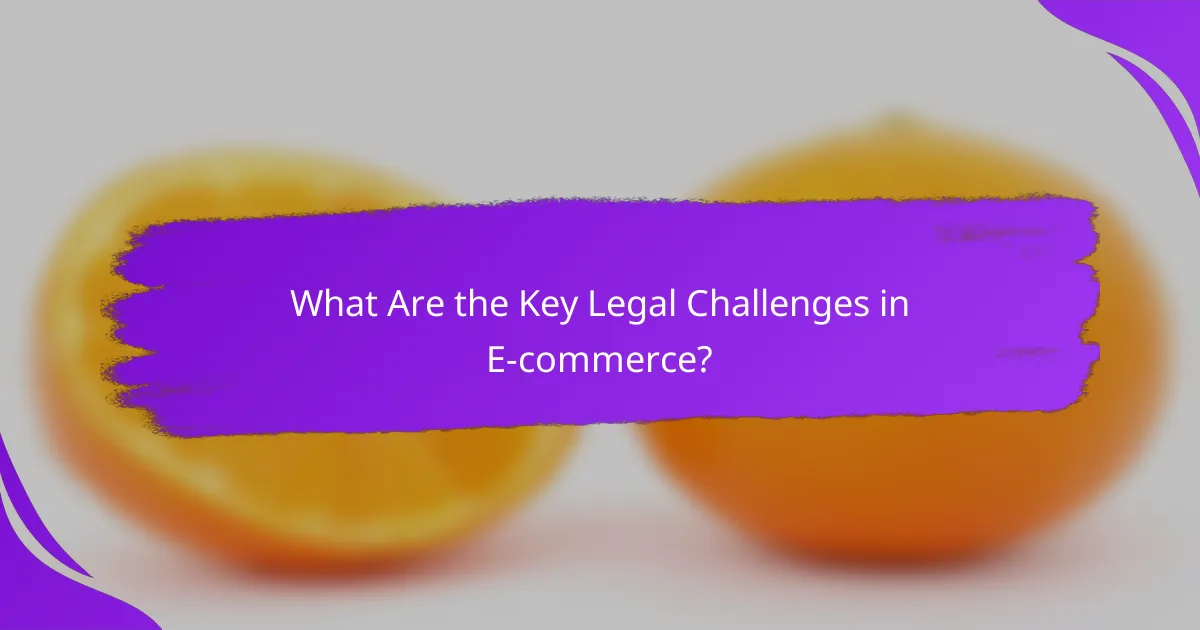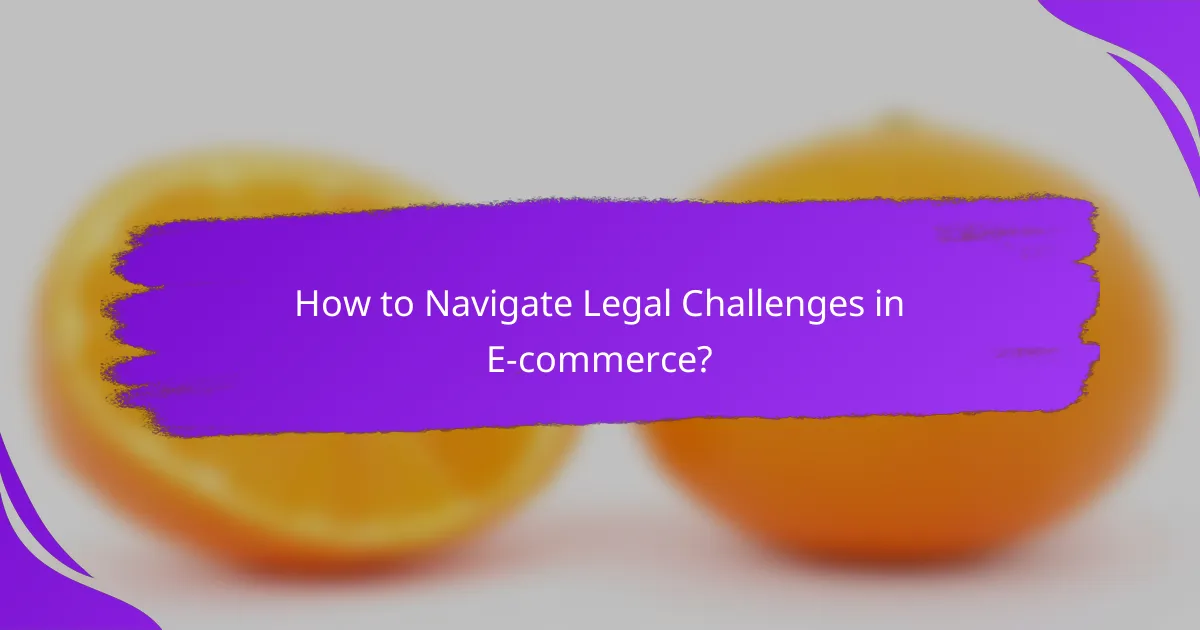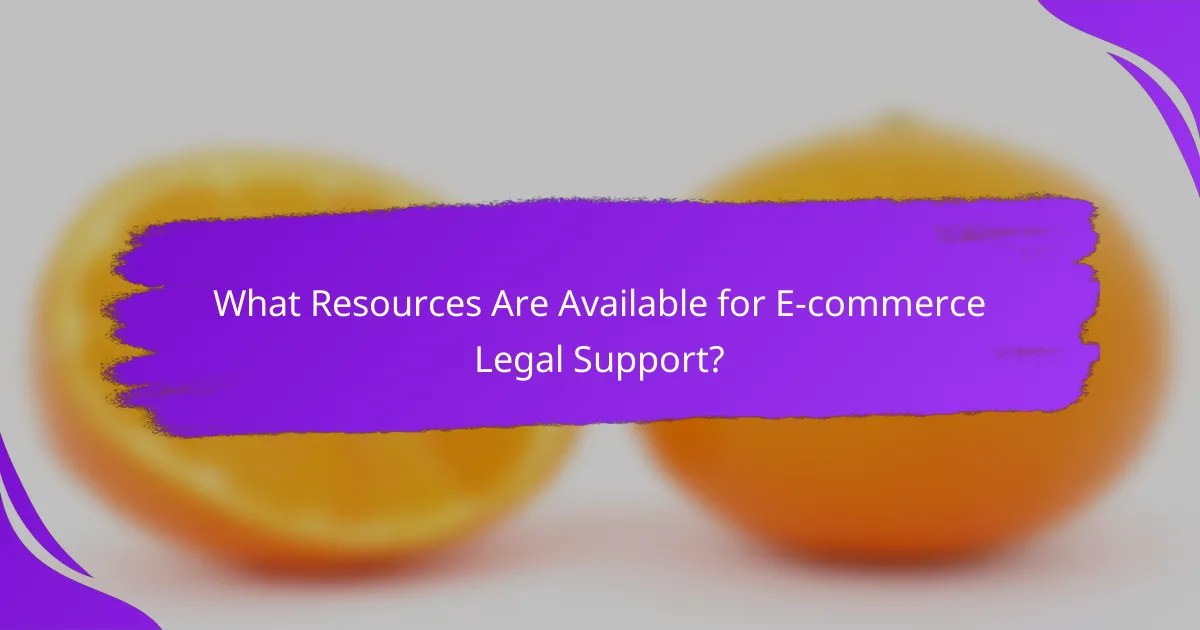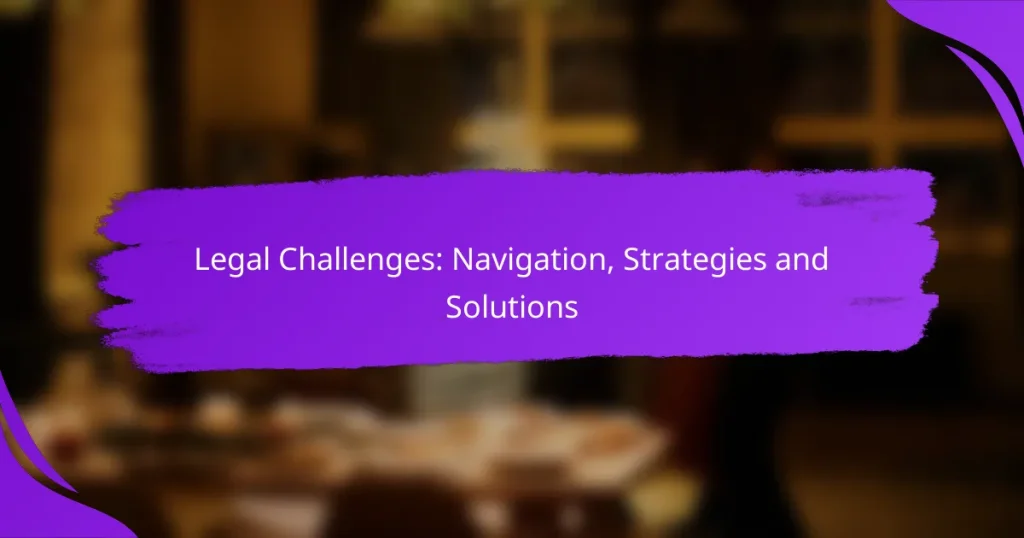In the rapidly evolving landscape of e-commerce, businesses face a myriad of legal challenges, including intellectual property disputes and data privacy compliance. Successfully navigating these issues is essential not only for legal operation but also for maintaining consumer trust. By proactively addressing potential legal risks through effective strategies, such as regular audits and clear terms of service, companies can safeguard their interests and foster a secure online environment.

What Are the Key Legal Challenges in E-commerce?
The key legal challenges in e-commerce include intellectual property disputes, data privacy compliance, consumer protection laws, and cross-border regulations. Navigating these issues is crucial for businesses to operate legally and maintain consumer trust.
Intellectual property disputes
Intellectual property disputes often arise in e-commerce due to the digital nature of products and services. Businesses must ensure they do not infringe on trademarks, copyrights, or patents owned by others. For instance, selling counterfeit goods can lead to significant legal repercussions.
To mitigate risks, companies should conduct thorough research on existing intellectual property rights before launching products. Registering trademarks and copyrights can also provide legal protection against infringement claims.
Data privacy compliance
Data privacy compliance is essential for e-commerce businesses, especially with regulations like the GDPR in Europe and CCPA in California. These laws require companies to protect customer data and provide transparency regarding its use. Non-compliance can result in hefty fines and damage to reputation.
To comply, businesses should implement robust data protection policies, conduct regular audits, and ensure customers can easily access and delete their data. Training employees on data privacy practices is also critical to maintaining compliance.
Consumer protection laws
Consumer protection laws are designed to safeguard buyers from unfair practices in e-commerce. These laws cover aspects such as product safety, accurate advertising, and the right to return goods. Businesses must adhere to these regulations to avoid legal disputes and maintain customer satisfaction.
To comply with consumer protection laws, e-commerce companies should provide clear product descriptions, transparent pricing, and easy return policies. Regularly reviewing these practices can help ensure ongoing compliance and customer trust.
Cross-border regulations
Cross-border regulations present challenges for e-commerce businesses that operate internationally. Different countries have varying laws regarding taxation, import/export restrictions, and consumer rights. Understanding these regulations is crucial to avoid legal complications and financial penalties.
To navigate cross-border regulations, businesses should consult legal experts familiar with international trade laws. Utilizing technology to manage compliance and staying updated on regulatory changes can also help streamline operations across borders.

How to Navigate Legal Challenges in E-commerce?
Navigating legal challenges in e-commerce involves understanding regulations, ensuring compliance, and implementing effective strategies. Businesses must be proactive in addressing potential legal issues to minimize risks and protect their interests.
Consulting legal experts
Engaging legal experts is crucial for e-commerce businesses facing complex regulations. These professionals can provide tailored advice on compliance with laws such as the General Data Protection Regulation (GDPR) in Europe or the California Consumer Privacy Act (CCPA) in the United States.
When selecting a legal expert, consider their experience in e-commerce and familiarity with your specific industry. Regular consultations can help you stay updated on legal changes and avoid costly mistakes.
Utilizing compliance software
Compliance software can streamline the process of adhering to legal requirements in e-commerce. These tools often include features for monitoring transactions, managing customer data, and ensuring adherence to relevant regulations.
Look for software that offers automated updates on legal changes and provides templates for necessary documentation. This can save time and reduce the risk of non-compliance, which can lead to fines or legal disputes.
Implementing best practices
Implementing best practices is essential for minimizing legal risks in e-commerce. This includes maintaining transparent privacy policies, securing customer data, and ensuring clear terms of service.
Regularly review and update your practices to align with evolving regulations. Training staff on compliance and legal issues can also enhance your business’s ability to navigate challenges effectively.

What Strategies Can Mitigate Legal Risks?
Implementing effective strategies can significantly reduce legal risks for businesses. Key approaches include regular legal audits, establishing clear terms and conditions, and creating effective dispute resolution mechanisms.
Regular legal audits
Conducting regular legal audits helps identify potential compliance issues and legal vulnerabilities. These audits should assess contracts, policies, and operational practices to ensure alignment with current laws and regulations.
Businesses should schedule audits at least annually or whenever significant changes occur, such as mergers or new product launches. Engaging legal professionals can enhance the effectiveness of these audits by providing expert insights.
Clear terms and conditions
Establishing clear terms and conditions is crucial for minimizing misunderstandings and disputes. These documents should outline the rights and responsibilities of all parties involved, including payment terms, delivery expectations, and liability limitations.
Ensure that terms and conditions are easily accessible and written in plain language to avoid ambiguity. Regularly review and update these documents to reflect changes in laws or business practices, which can help prevent legal challenges.
Effective dispute resolution mechanisms
Implementing effective dispute resolution mechanisms can save time and resources when conflicts arise. Options such as mediation or arbitration can provide quicker resolutions compared to traditional litigation, which can be lengthy and costly.
Businesses should clearly outline their preferred dispute resolution processes in contracts. Consider including clauses that specify the method of resolution, the governing law, and the jurisdiction to streamline the process and reduce uncertainty.

What Are the Costs of Legal Non-compliance?
The costs of legal non-compliance can be significant, impacting a business’s finances, reputation, and operations. These costs often manifest in various forms, including fines, damage to public perception, and interruptions to business activities.
Fines and penalties
Fines and penalties are direct financial consequences of failing to comply with legal requirements. These can range from minor fees to substantial financial liabilities, sometimes reaching hundreds of thousands or even millions of dollars, depending on the severity of the violation and the jurisdiction.
In the United States, for example, regulatory bodies like the Environmental Protection Agency (EPA) or the Occupational Safety and Health Administration (OSHA) impose fines for non-compliance with environmental and safety regulations. Businesses should regularly review compliance guidelines to avoid unexpected penalties.
Reputation damage
Reputation damage is a critical cost that can arise from legal non-compliance, affecting customer trust and brand loyalty. Negative publicity can lead to a decline in sales and customer retention, as consumers may choose to avoid businesses with a history of legal issues.
For instance, companies that face lawsuits or regulatory actions often see a drop in stock prices and public sentiment. To mitigate this risk, organizations should prioritize transparency and proactive communication with stakeholders regarding compliance efforts.
Operational disruptions
Operational disruptions can occur when a business faces legal challenges, leading to interruptions in daily activities. These disruptions can stem from investigations, litigation, or the need to implement corrective measures, which can divert resources and focus away from core operations.
For example, a company under investigation may need to allocate significant time and personnel to respond to legal inquiries, impacting productivity. To minimize operational risks, businesses should establish robust compliance programs and conduct regular audits to identify potential issues before they escalate.

What Resources Are Available for E-commerce Legal Support?
E-commerce businesses can access various resources for legal support, including legal tech platforms, online legal services, and professional networks. These resources help navigate complex regulations and ensure compliance with laws affecting online commerce.
Legal tech platforms
Legal tech platforms provide digital tools designed to simplify legal processes for e-commerce businesses. They often include features like contract management, compliance tracking, and automated legal document generation, making it easier to handle legal requirements efficiently.
When selecting a legal tech platform, consider factors such as user-friendliness, integration capabilities with existing systems, and the specific legal areas they cover. Popular platforms may offer subscription models or pay-per-use options, allowing businesses to choose based on their needs and budget.
Examples of well-known legal tech platforms include Rocket Lawyer, LegalZoom, and LawDepot. These services can help businesses save time and reduce costs associated with legal consultations, but it’s essential to ensure that the platform aligns with your specific legal requirements and jurisdiction.


